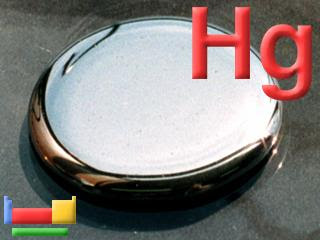Mercury
Read the story here.
All about mercury.
Heavy duty scientific description of mercury and its uses.
This story intrigued me for several reasons. One is its lack of focus on two boys stealing an unknown substance from a science lab and playing with it - all over town. How dumb are kids and teachers today? I knew what mercury was in grade school. More than one student had some and played with it, getting a drop from a thermometer or an old thermostat. We were warned not to do it because of its toxicity so that stopped.
Another reason is the article I published many years ago. Mercury is an interesting metal because of its affinity to gold and silver. As many people know, playing with mercury near a gold ring will result in a mercury coated ring. The mercury will not wash off. This property was used to mine gold and silver.
Mercury is still used to make fillings for teeth. Dentists call it silver or amalgam, but a more precise name is mercury amalgam. Silver is too brittle to be used as a filling, so mercury is used to soften the silver. The two elements bind up together and make a paste that hardens into the former cavity.
Mercury reminds me of Reformed doctrine, which has a great affinity for Lutheran doctrine. Once Reformed doctrine attaches itself to Lutheran doctrine, the two cannot be separated. Luther struggled with Reformed influence in attacking the truth of Holy Communion, first in his debate with Zwingli. As Bente has shown in his Historical Introductions to the Book of Concord, Calvinism took over after Luther died. The secret Calvinists controlled the Lutheran theology faculties, just as they do today.
Pietism is an amalgamation of Lutheran and Reformed doctrine. Most of the founders of Lutheran synods in America were Pietists, starting with Muhlenberg (General Synod) and ending with Walther, the Norwegians, Swedes (Augustana), Germans, and Gloomy Danes.
Every attempt to promote Lutheran-Reformed cooperation has depended on Lutherans giving up the distinctive Biblical doctrines of the Reformation - the efficacy of the Word, baptismal regeneration, and the Real Presence in Holy Communion. All the Lutheran groups have leaders who actively promote Reformed doctrine learned at summer camp (Fuller, Willow Creek, Granger, Northpoint, Mars Hill, Trinity Deerfield).
No Reformed group has covert Lutherans who:
- plot to introduce the efficacy of the Word and Sacraments,
- sell Lutheran books at Schwaermer gatherings,
- quietly get rid of faithful Reformed ministers or slander them into silence,
- talk glowingly about the Means of Grace while bashing Enthusiasm,
- publish articles extolling Luther and Chemnitz in the denominational magazines,
- lead seminars where students and pastors learn how to get rid of gimmicks and methods,
- offer worship services, just as experiment, where the liturgy, creeds, and an organ are used,
- organize parachurch groups to promote Lutheran doctrine.

